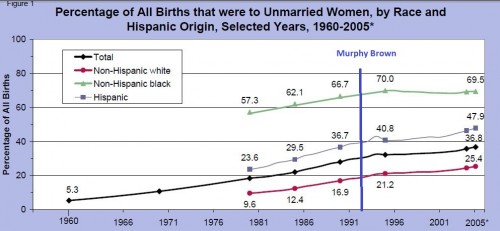Cross-posted at Montclair SocioBlog.
I’m not sure what effect prime-time sitcoms have on the general public. Very little, I suspect, but I don’t know the literature on the topic. Still, it’s surprising how many people with a similar lack of knowledge assume that the effect is large and usually for the worse.
Isabel Sawhill, is a serious researcher at Brookings; her areas are poverty and inequality. Now, in a Washington Post article, she, says that Dan Quayle was right about Murphy Brown.
Some quick history for those who were out of the room — or hadn’t yet entered the room: In 1992, Dan Quayle was vice-president under Bush I. Murphy Brown was the title character on a popular sitcom then in its fourth season — a divorced TV news anchor played by Candice Bergen. On the show, she got pregnant. When the father, her ex, refused to remarry her, she decided to have the baby and raise it on her own.
Dan Quayle, in his second most famous moment,* gave a campaign speech about family values that included this:
Bearing babies irresponsibly is simply wrong… Failing to support children one has fathered is wrong… It doesn’t help matters when prime-time TV has Murphy Brown, a character who supposedly epitomizes today’s intelligent, highly paid professional woman, mocking the importance of fathers by bearing a child alone and calling it just another lifestyle choice.
Sawhill, citing her own research and that of others, argues that Quayle was right about families: children raised by married parents are better off in many ways — health, education, income, and other measures of well-being — than are children raised by unmarried parents whether single or together.**
But Sawhill also says that Quayle was right about the more famous part of the statement – that “Murphy Brown” was partly to blame for the rise in nonmarried parenthood.
Dan Quayle was right. Unless the media, parents and other influential leaders celebrate marriage as the best environment for raising children, the new trend — bringing up baby alone — may be irreversible.
Sawhill, following Quayle, gives pride of place to the media. But unfortunately, she cites no evidence on the effects of sitcoms or the media in general on unwed parenthood. I did, however, find a graph of trends in unwed motherhood. It shows the percent of all babies that were born to unmarried mothers. I have added a vertical line to indicate the Murphy Brown moment.
The “Murphy Brown” effect is, at the very least, hard to detect. The rise is general across all racial groups, including those who were probably not watching a sitcom whose characters were all white and well-off. Also, the trend begins well before “Murphy Brown” ever saw the light of prime time. So 1992, with Murphy Brown’s fateful decision, was no more a turning point than was 1986, for example, a year when the two top TV shows were “The Cosby Show” and “Family Ties,” sitcoms with a very low rate of single parenthood and, at least for “Cosby,” a more inclusive demographic.
————————
* Quayle’s most remembered moment: when a schoolboy wrote “potato” on the blackboard, Quayle “corrected” him by getting him to add a final “e” – “potatoe.” “There you go,” said the vice-president of the United States approvingly. (A 15-second video is here.)
** These results are not surprising. Compared with other wealthy countries, the US does less to support poor children and families or to ease the deleterious effects on children who have been so foolhardy as to choose poor, unmarried parents.



Comments 17
lunad — June 6, 2012
The thing that bothered me the most about this article (aside from the horrible scholarship) was the conflation of two very different family types - the poor single mother, with no money for quality child care, inflexible work hours, no paid time off, etc, and the character: a well off TV news anchor.
This is my favorite quote from the article: "A lifestyle once associated with poverty has become mainstream. The only
group of parents for whom marriage continues to be the norm is the
college-educated."
In other words, the lifestyle is still associated with poverty.
Ashley Patriarca — June 6, 2012
Correlation does not equal causation.
As you suggest, the Murphy Brown episode that Sawhill describes seems more to have been a reflection of changes that were already occurring off the television. Those changes have continued to occur over the past two decades, not necessarily because of this single episode. What we may be seeing instead is that it's easier for single mothers to be open about their situation, or not rushing into ill-advised marriages for the sake of the children. We may not, of course.
Derp — June 6, 2012
So the Murphy Brown's boyfriend wouldn't marry her, but it was HER fault that she was "bearing a child alone?" I guess they could have gone with an abortion storyline instead...
Ted_Howard — June 6, 2012
I did not read the article as claiming that Murphy Brown alone led to the rise in unwed motherhood. I think her point was that the media, broadly speaking, has normalized unwed motherhood, which has led to its increase. Obviously this is a difficult hypothesis to prove. It's basically impossible to construct a treatment group (who hasn't been exposed to the media in some capacity?) and I can't even fathom what instrumental variable one could use in a regression to uncover causality. Empirically, it seems more-or-less impossible to demonstrate the media has significant effects on social behavior. Intuitively, I doubt the media has as much effect as people imagine. Most of the media products generated are produced by large firms whose goal is profit maximization. These firms aren't typically known for trying to break new ground, as this is risky. It seems most plausible that media firms will generate content that mimics the current trend in social norms. There may be some feedback effects, but the primary causal factors are probably not media, but other social changes that the media is merely responding too.
Also, I doubt unwed motherhood is a causal variable for poverty, so we should really only worry about unwed motherhood specifically (rather than the poor generally) in-so-far as this has an inordinately negative impacts on the child (which the literature suggests it does). Most of the economic literature has found that the exact same variables can pretty much account for economic and social outcomes. Unwed mothers are mostly poor because the type of people who become unwed mothers are usually the same type of people who would be poor anyway (though, of course, motherhood has an additional financial burden) - those with low cognitive and non-cognitive skills. Rather than worrying about the effects of the media, which really can't be measured and are largely beyond anyone's control, it would be more instructive to think of ways to raise the cognitive and non-cognitive skills of those individuals at the bottom of the ability distribution. For example, non-cognitive abilities (perseverance, motivation, risk aversion, self-control etc.) have been found to be as (or sometimes more) important than actual cognitive abilities (e.g. raw intelligence and human capital) in wage determination and is by far the strongest predictor of what we might call harmful social behaviors (like unwed single motherhood). We also know that the inequality in both cognitive and non-cognitive skills emerges extremely early in children. But what a lot of research has found is that that early childhood interventions (this includes both early education programs and a variety of other interventions) can change these non-cognitive abilities substantially (in fact, a lot of the success of those early education programs actually works through the non-cognitive channel). So, why not talk about early childhood intervention programs to encourage certain non-cognitive abilities? Of course, these type of programs have long-run payoffs and do nothing about the issue now. Adult training programs have been found to be close to worthless, so trying intervention programs with current unwed mothers isn't likely to work (though I think we should experiment at small scales). But if we really do care about the welfare of unwed mothers, why not redistribute more income to them? This will probably also have a positive effect on their children's future since the mother will be less financially constrained and could plausibly spend more time with her young child, which has likely causal effects on cognitive and non-cognitive development.
Grace Scrimgeour — June 6, 2012
I understand that while poverty and single parenthood are correlated, this disappears when you control for mother's education.
Susan Quesal — June 7, 2012
Single motherhood/unmarriedness is not the problem. Poverty is the problem. Lack of social services for the poor, lack of community support for single mothers, low wages for service-sector or unskilled jobs, unequal access to education and medical services. This notion that things will be better if only married people raise children mistakes correlation for causation in order to reinforce the power of the traditional family structure. Classic sociological work.
pduggie — June 7, 2012
Since this blog constantly argues that the message of the media on female appearance, male gendered performance, or what have you has HUGE and subtle effects all through out the culture, does she need to back her claim up with more evidence?
Roysnep — July 14, 2012
I like the article but is it
treu?